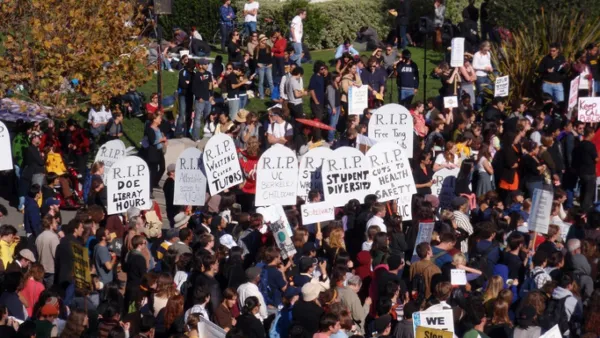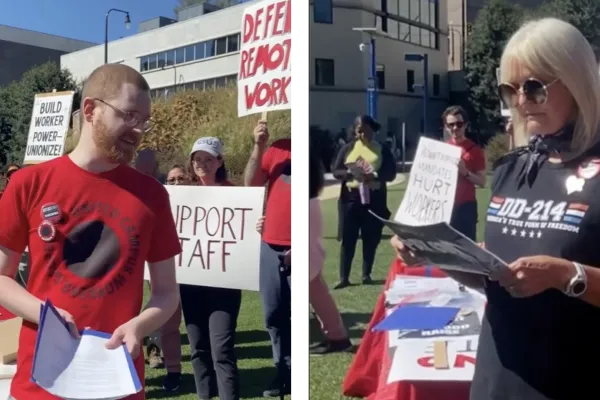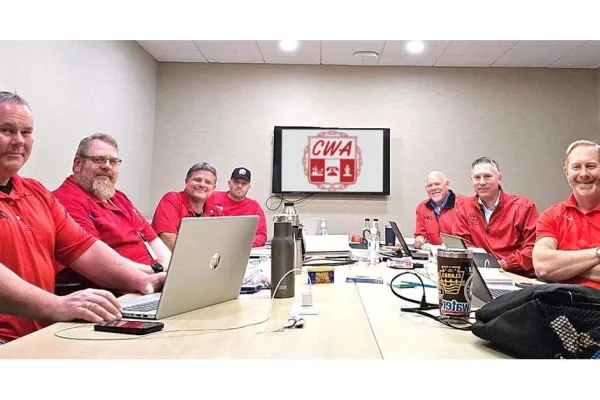Fighting Neoliberal Universities in States without Bargaining Rights

By Melanie Barron, Karly Safar and Kate Diedrick in The Forge October 12, 2020
New staff member at University of Georgia: “Oh, I didn’t know we had a union for staff here. Yes, I’d like to join. Do you have a copy of the contract?”
Organizer: “We don’t have a contract. Public sector employees in Georgia don’t have collective bargaining rights. But you can come to the union meeting tonight, meet members — who come from all job categories across campus — and get plugged in to a current campaign.”
New staff member: Oh, wow. I grew up in Detroit in a union family, and I’ve never heard of a union like this.
Organizer: Yes, we’re a little different. But in a lot of ways, our differences are a good thing! For one, our members are all together in one big union, so we have a larger base and a louder collective voice. Come and check it out!
United Campus Workers (UCW) was born at the University of Tennessee in Knoxville in 2000 when staff and faculty brought a citywide living wage fight to campus. The Campus Workers for a Living Wage campaign won a nearly five percent pay raise; the lowest-paid employees received upwards of a 12 percent increase. That success led students and workers to form a permanent organization to campaign not just for better working and learning conditions on campus but for democratic, worker-run universities.
Today, UCW (now affiliated with CWA) is a fighting union, with locals in Alabama, Arizona, Colorado, Georgia, Kentucky, Louisiana, Mississippi, South Carolina, Tennessee, and Virginia. While organizing without collective bargaining rights is certainly an obstacle, we also see it as an opportunity to go deep. Nearly every member who joins our unions did so because someone asked. UCW undermines neoliberal universities by bringing workers who are never meant to cross paths into conversation about how to fundamentally transform higher education.
The Wall-to-Wall Model
Decades of budget cuts have hollowed out public higher education, leading universities to rely on corporate funding, contingent faculty, and low-wage staff.
With few important exceptions, such as the Coalition of Rutgers Unions, unions in public higher education are segregated by job category and workers are pitted against one another to fight for scarce resources. There is no better example than adjunct faculty, who make up three-fourths of the faculty at academic institutions nationally. Adjuncts are paid so little that they usually have to teach five classes a semester; they are cut out of decision-making processes and are often afraid to speak out for fear of losing their already-precarious jobs. Tenured and tenure-track faculty are much more likely to demand the cost-of-living raise they haven’t had in five years than an increase in adjunct pay. Faculty governance has already been decimated by the corporate-managerial model of higher ed; many tenured faculty resist attempts to include non-tenure track faculty and staff in decision-making in an effort to hold on to the little power they have left.
One of the strengths of UCW’s model is that we bring members together across job categories and institutions to make demands in a unified voice, challenging the decision-makers who seek to undercut us, divide us, or dismiss the issues of one worker group as not relevant to another worker group.
Rather than dividing workers into separate organizing committees by job category, UCW unions meet as chapters to bring together all of the workers on a particular campus. This structure creates space for members across job categories to share their issues; have difficult conversations about topics such as pay differentials, power imbalances, gendered workloads, racism, and classism; and develop joint demands.
Building this kind of solidarity and consensus takes work. At East Tennessee State University, UCW members spent the 2019-2020 school year documenting the experiences of adjunct faculty. We convened focus groups of adjuncts and tenure-track faculty to talk about adjunct pay, lack of benefits, and poor treatment. What we found is that many faculty members with tenure believed that, while there are structural problems with the university’s reliance on adjunct faculty, their department treated adjuncts as full members of the faculty.
Adjunct faculty told a different story. As one put it: “I feel the second-class status very much. I am definitely a junior member of the team.… Most of the time, I’m involved in the department, it’s always very clerical. One time, I went to a committee meeting, and I might as well not have been there.” The focus groups themselves ended up serving as organizing conversations that built a sense of commonality and solidarity among tenured faculty, adjuncts, and staff while raising awareness about the issues adjuncts face. As a result of these conversations, more union members joined the adjunct campaign, and more adjuncts joined the union. Information gathered during focus groups was collated into a report on the adjunct experience at ETSU, which we used to support a legislative campaign to raise adjunct pay across Tennessee as well as an (ongoing) campaign to protect adjunct jobs during the pandemic.
One of the challenges that arises from our model is the power differentials among some UCW members. We bring graduate students into the same union as their advisors and staff into the same union as their managers. This can foster fear. For instance, graduate workers who have issues with their advisors have been hesitant to get involved when their advisers are active in the union. We resolve these issues through one-on-one conversations and small-group discussions, addressing problems head on as they arise. We also take on plenty of fights within departments around issues of unfair treatment and abusive supervisors (the bad bosses are usually not union members anyway). But, on the whole, we believe that uniting around a shared mission is critical to making the structural changes that cause these problems in the first place.
While UCW locals campaign on a broad range of member issues — low pay, high grad fees, lack of cost-of-living raises, pay equity — we unite around common, big-picture, and long-term demands: increased public support for higher education and decision-making power for workers and students.
We see success as a process, bigger than a specific outcome, such as the passage of a certain bill, pay increases, or earned media hits on an action. A protest that took months to plan is a success if members from all job categories helped organize it and, through the process, one or two new members developed systematic organizing skills, such as working with lists, making asks of other members, and following up with a sense of urgency. Developing these skills is critical because members run UCW unions; the leadership bodies are volunteer and, while there are paid staff, members do most of the work and maintain control of their chapters and locals.
As a result, UCW campaigns take time to develop: petition drafts go through multiple rounds; actions might be planned and then cancelled based on member feedback. While this can be trying for organizers, it also helps build healthy, worker-run organizations based in cross-campus solidarity. UCW members at Georgia Tech spent three times as long on a petition for pandemic-related protections as a faculty-only group that produced its own petition. But the UCW petition included demands important to other workers and students, for instance, that the university should provide housing assistance for anyone without a safe place to live. The UCW model challenges members to form demands that speak to everyone and undermine no one (except the boss).
We also hold ourselves to fighting on campaigns that undermine the university’s neoliberal business model. This isn’t always easy. Ask for grievances on a college campus, and what’s the first complaint? Parking fees. (Deep sigh.) Campus parking fees are a pain and having to pay to park at work is a widely-felt issue, but poverty wages are much more deeply felt. Fighting for living wages can thus have a far more significant impact than fighting to cut a fee. Picking fights that stand to transform the university and raise the standard of living for all workers helps us build a broad and powerful base mobilized around a future worth fighting for.
“Outsourcing Just Doesn’t Work for Anybody”
Part of UCW’s work is demonstrating the shared stakes all workers on campus have in a particular fight. Members learn those stakes through a commitment to digging deep with other workers and building unity in sometimes unlikely circumstances. Even though workers may not always interact face-to-face or in direct day-to-day tasks, everyone contributes to the daily effort of providing public education.
UCW’s most notable victory was the Tennessee is Not for Sale campaign. When Tennessee’s governor hatched a plan to reduce the state’s workforce by outsourcing thousands of facilities workers, UCW of TN launched a statewide campaign to fight back. In union spaces, members talked frankly and practically about how outsourcing would impact them. Faculty shared how employee turnover with a private cleaning company would impact facilities. Clerical staff explained how outsourcing would put more work on them by slowing down maintenance on their buildings. Students argued that it’s just wrong to get rid of pay and benefits for long-time employees to support corporate profits. And the facilities workers themselves expressed how the prospect of outsourcing felt like a betrayal from the workplace they had given so much to. The union is often the only space on campus where that kind of conversation happens.
Through thousands of conversations in union meetings and on shop floors, UCW developed a shared understanding that outsourcing just doesn’t work for anybody. Along the way, this meant that we had thousands of conversations with our members about what outsourcing and privatization is, why it happens, and why we all deserve better.
All those conversations led to dozens of campus actions, trips to Nashville, newspaper articles, and community meetings. After two years of campaigning, our universities opted out of the statewide outsourcing plan, essentially killing it for most public facilities across the state. Through constant pressure, we overcame divide-and-conquer strategies — most notably the governor’s attempt to allow individual universities to “opt in” to the plan, rather than the originally proposed mandate. Members could maintain that pressure because of the solidarity they had built with one another.
Building solidarity doesn’t come easily. It’s often described by organizers and members as pushing a boulder up a hill, one that keeps getting steeper over time. But, in a moment in which the future is so uncertain, it’s more important than ever that we maintain our commitment to unity among all workers on campus. Each one of us plays an essential role, and all of us will be necessary in the fight to reclaim higher education.
Georgia public universities’ ‘return to office’ mandate may spark exodus


